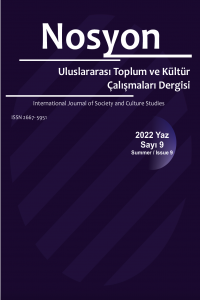Abstract
İlk olarak Çin’de görülen ve 13 Ocak 2020 tarihinde tanımlanan Covid-19 salgını, tüm dünyayı etkisi altına almış ve toplumları ekonomik, sosyal, siyasi pek çok alanda derinden etkilemiştir. Dünyada Covid 19 salgınını kontrol altına alma çabasıyla başta Sinovac, Biontech, Moderna, Astrazeneca, Sputnik V, Sinopharm olmak üzere pek çok aşı çalışması ile dünyada geniş ölçekli aşı kampanyaları, zorunlu aşılama uygulamaları, toplumlarda aşı kararsızlığı ve aşı karşıtlığı tepkilerini yeniden gündeme getirmiştir. Bu noktada geçmişten bugüne varlık gösteren aşı reddi/aşı karşıtlığına ilişkin tutum ve tepkiler Covid 19 özelinde şekillenmeye başlamış, aşılama süreçlerinde aşı tereddüdü/kararsızlığı kavramı tartışmaları gündeme gelmiştir. Bu çalışmanın amacı bireylerin Covid 19 aşılama sürecine yönelik mesafeli yaklaşımlarının altında yatan nedenleri ve bireylerin aşıya yönelik tutumlarını açıklayabilmektir. Bu çalışma, Doğu Anadolu Bölgesinde bulunan Bitlis ili özelinde bireylerin aşıya yönelik düşünceleri ve aşılanma oranlarındaki düşüklüğün nedenlerini bir alan araştırması ile değerlendirmeyi amaçlamaktadır. Çalışma kapsamında, Covid 19 aşılarına yönelik kararsızlık yaşayan katılımcılar ile yapılan derinlemesine görüşmelerle aşı kararsızlığının altında yatan nedenlerin ifade edilmesi ve akademik alandaki bir boşluğun doldurulmasının yanı sıra aşılanma noktasında karşı karşıya gelen gruplar ile kurumların iletişimine katkı sağlanması hedeflenmektedir. Nitel araştırma yöntemiyle gerçekleştirilen çalışma, Covid 19 salgınının ve aşılanmanın yeni gelişen bir süreç olması nedeniyle keşfedici bir modele dayanmaktadır. Amaçlı örnekleme tekniği kullanılan araştırmaya Bitlis ilinde ikamet eden farklı demografik özelliklere sahip, tek doz aşı olmuş ya da hiç olmamış 15 yetişkin birey katılmıştır. Görüşmeler sonucunda elde edilen veriler çalışmanın amacına uygun temalar çerçevesinde analiz edilmiştir.
Keywords
References
- Aker, A. A. (2018). Aşı karşıtlığı. Toplum ve Hekim, 33(3), 175-186.
- Beck, U. (2011). Risk toplumu: Başka bir modernliğe doğru. İstanbul: İthaki Yayınları.
Abstract
The Covid-19 epidemic, which was first seen in China and defined on January 13, 2020, has affected the whole world and has deeply affected societies in many economic, social and political areas. In an effort to control the Covid 19 epidemic in the world, many vaccine studies, especially Sinovac, Biontech, Moderna, Astrazeneca, Sputnik V, Sinopharm, have brought large-scale vaccination campaigns, compulsory vaccination practices, vaccine hesitancy and anti-vaccine reactions in societies to the agenda again. At this point, attitudes and reactions to vaccine refusal/ anti vaccination, which have existed from the past to the present, have started to take shape in the context of Covid 19, and the debates on the concept of vaccine hesitancy/indecision in vaccination processes have become a current issue. The aim of this study is to explain the reasons behind the distanced approach of individuals towards the Covid 19 vaccination process and their attitudes towards the vaccine. The main question of the study; Is it anti-vaccination or vaccine hesitancy that individuals do not get vaccinated or do not complete the vaccination process? This study aims to evaluate the thoughts of individuals regarding the vaccine and the reasons for the low vaccination rates in the province of Bitlis in the Eastern Anatolia Region with a field study. Within the scope of the study, it is aimed to identify the underlying causes of vaccine hesitancy with in-depth interviews with participants who are hesitant about Covid 19 vaccines and to fill a gap in the academic field, as well as to contribute to the communication of groups and institutions that conflict at the point of vaccination. The study, which was carried out with the qualitative research method, is based on an exploratory model since the Covid 19 epidemic and vaccination are a newly developing process. 15 adult individuals with different demographic characteristics, residing in the province of Bitlis, who have received a single dose or never been vaccinated, have participated in the study in which purposive sampling technique was used. The data obtained as a result of the interviews were analyzed within the framework of the themes which are relevant to the purpose of the study.
References
- Aker, A. A. (2018). Aşı karşıtlığı. Toplum ve Hekim, 33(3), 175-186.
- Beck, U. (2011). Risk toplumu: Başka bir modernliğe doğru. İstanbul: İthaki Yayınları.
Details
| Primary Language | Turkish |
|---|---|
| Subjects | Sociology |
| Journal Section | Research Articles |
| Authors | |
| Early Pub Date | June 30, 2022 |
| Publication Date | June 30, 2022 |
| Submission Date | February 16, 2022 |
| Published in Issue | Year 2022 Issue: 9 |

